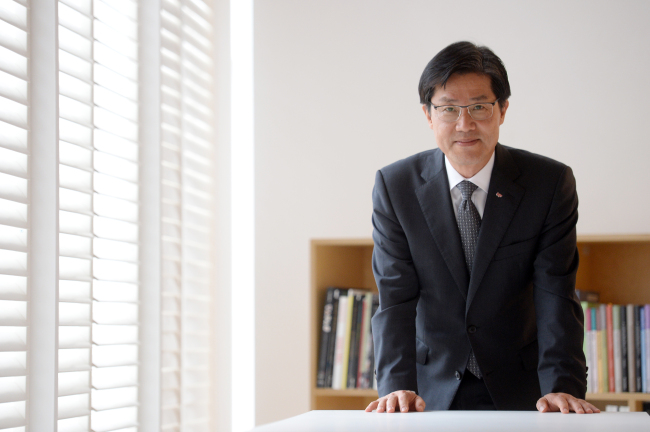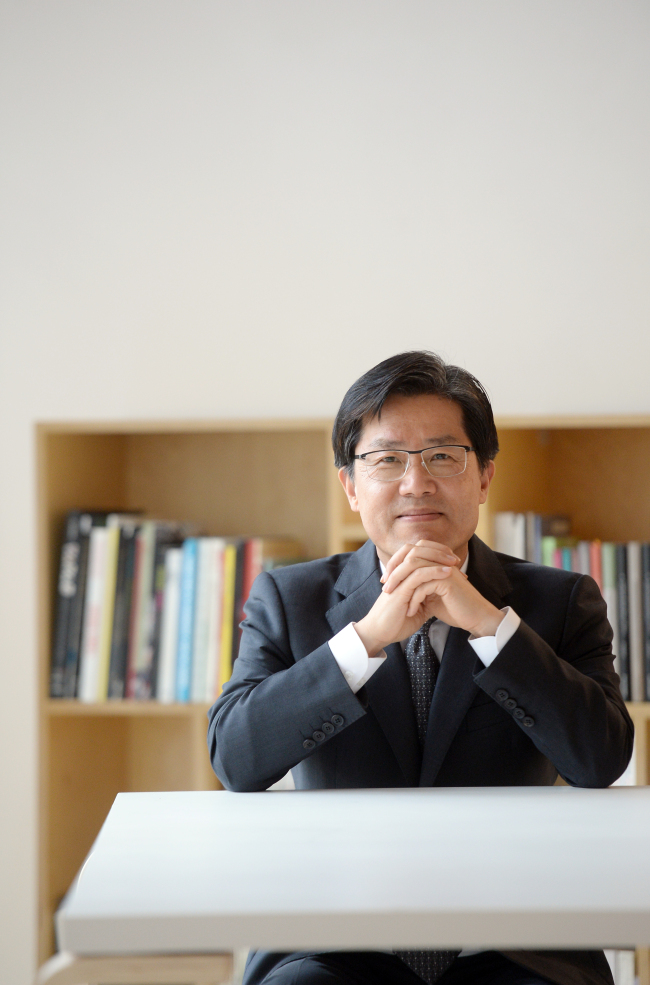For decades, public diplomacy has been deemed a long shot in Korea’s statecraft, focusing heavily on shoring up the economy and expanding cooperation with other governments. It has only been in recent years that it began taking root as a key item on the foreign policy agenda.
Meanwhile, quiet yet constant efforts have been made to elevate national prestige and policy understanding toward the essence of public diplomacy. With the Korea Foundation at the forefront, the country supports Korean studies abroad, cultural events, academic and people-to-people exchanges, overseas publications and other programs.
 |
Korea Foundation president Lee Si-hyung (Ahn Hoon/The Korea Herald) |
Seoul’s public diplomacy is now set to enter the next phase under the standalone law that has become effective recently, designed to lay its legal and institutional groundwork.
And the foundation, its chief said, is also ready to take on the new foray -- with a more creative and multifaceted approach.
“Though we’re a late starter, it’s time to become a fast mover, now with public diplomacy being a core component in our foreign policy,” said Lee Si-hyung, the KF president, in an interview with The Korea Herald.
“To survive a legitimate public diplomacy institution among many competitive players, the KF needs to uncover what others would find it difficult to do, capitalizing on its standing as a 1.5-track agency and 25 years of experience.”
The 59-year-old Lee took the helm of the Seoul-based organization last May after retiring from the Foreign Ministry. Throughout his 36-year career, he took up various key posts including ambassador to the Organization for Economic Cooperation and Development in Paris, Poland and East Asia economic cooperation in Seoul, deputy minister for trade and director-general for economic cooperation at the Finance Ministry.
 |
(Ahn Hoon/The Korea Herald) |
Under the legislation, which came into force on Aug. 4, an intergovernmental committee chaired by the foreign minister will be set up early next year to deliberate on a five-year basic framework and annual action plans.
The KF is designated as the main implementer of various public diplomacy activities, for which 14.2 billion won ($12.9 million) has been earmarked this year in total.
“Given our own under 50 billion won annual budget, we expect to be able to carry out a few more projects with the support of the ministry, but what’s important is that we do projects that could have a real impact,” Lee said.
One of the relatively little-focused-on targets could be the some 2 million foreign nationals residing in Korea, he noted.
The foundation has in recent years been offering venues for networking between locals and non-Koreans, such as seminars or lectures for international students given by Koreans, or vice versa.
“It may be somewhat a different type of public diplomacy relative to past practices, but I do see the need, not merely for the KF but also among local governments, to which we can be of help,” he said.
Yet he ditched the notion of strictly being “Korean” in order to promote Korean products on the world stage. In the realm of literature, for instance, traditional values or nationalistic themes such as the Korean War have long been cherished.
Novelist Han Kang’s “The Vegetarian,” however, broke the convention and discovered the potential for Korea’s sheer international appeal when it won the coveted Man Booker Prize early this year, he said.
The KF also backed the studies of Deborah Smith, the novel’s much-acclaimed translator, by providing her scholarships totaling nearly 40 million won from 2013-15.
“Han picked a globally understood topic for her work beyond nationalism and enlightenment alike at a time when many were struggling to keep up with international trends -- ironically, there was much controversy when it won the prestigious Yi Sang Literary Award some 10 years ago at home,” Lee noted.
 |
(Ahn Hoon/The Korea Herald) |
“Traditional items are also crucial assets but we don’t necessarily need to cling to it, and many Koreans have won prizes in modern ballet, classic music and other areas overseas. I believe we are competitive enough under the global standard.”
But the foundation faces challenges as it is set to move to Jejudo Island as early as next year.
While its employees are grappling with their own family and livelihood issues, concerns have grown over possible networking difficulties given that Seoul remains foreign visitors’ top -- and often single -- destination during their stay here.
“The relocation issue has emerged as one that could determine the organization’s footing, with an exodus having already begun among those who seized other opportunities in Seoul,” Lee said.
“To minimize uncertainties, we hope to conclude negotiations with the Jeju government on the site in a way that reduces our financial losses as early as possible.”
By Shin Hyon-hee (
heeshin@heraldcorp.com)










